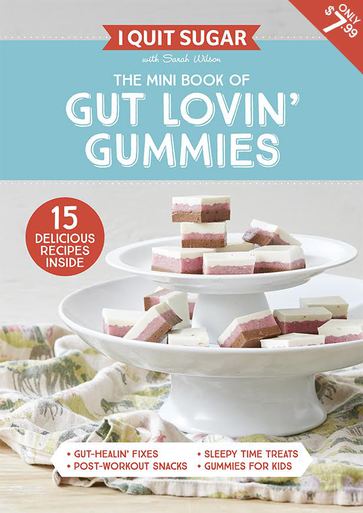I’m gut-health obsessed. I talk about gut health a lot, here and elsewhere. I believe most contemporary ills stem from gut issues and I’ve got my fair share of personal experience. Today, I’m sharing some of the tips and tricks I’ve accumulated in my years of research on the topic.

1. Don’t worry about dirt on veggies.
A little dirt provides your gut with some soil-based organisms, which, through a process of gene swapping with the microbiome, have been found to strengthen the immune system. European scientists worked out this is why kids living on organic farms are far less likely to develop asthma or allergies. They call it the “farm effect”. I reckon I have this…I used to live in dirt, eat dirt and certainly didn’t have a germ-a-phobe mum.
2. Quit sugar.
Sugar is your microbiome’s worst enemy. It promotes the growth of bad bacteria in the gut and hampers the growth of the good stuff. But good news: the effects of sugar are not irreversible (unlike the effects of seed oils, for instance). When you quit the white stuff and Just Eat Real Food, your gut flora will repair itself.
3. Avoid Aspartame.
It’s converted to formaldehyde (yep, the stuff used an embalming fluid) in your body. Your liver can’t clear this toxin normally, so it remains lodged, activates inflammation in your gut and can lead to autoimmune issues and cancer growth.
4. Just Eat Real Food.
Because processed foods contain all the things you should avoid if you’re aiming for a healthy balance of gut bacteria. Trans fats, sugars, artificial additives and emulsifiers are just some of the ingredients that are likely to throw your microbiome out of whack.
5. Ditch the other fake sugars.
Sugar alcohols are, for the most part, indigestible and rot in your gut. Sugar alcohols end in -ol. Eg sorbitol, mannitol and our bodies aren’t able to effectively break them down. They disrupt the functioning of the lining of the gut and they can trigger gastric distress, bloating and diarrhoea. Xylitol and erythritol are sugar alcohols I, but both are safe to consume in small quantities and I happily eat them in products like kombucha where they assist in the gut-healing fermentation process.
6. Drink beet kvass.
A traditional Ukrainian drink, beet kvass is fermented with lactobacillus bacteria and is a pink probiotic powerhouse punch with a slightly rustic, earthy flavour. The bacteria helps boost the production of stomach acid, which in turn creates the right environment for “good bacteria” to grow. Try my Beet Kvass recipe.
7. Eat fermented foods like kefir, kombucha, kimchi, sauerkraut.
Again, the lactic-acid producing bacteria in fermented foods help the production of stomach acid. I swear by the efficacy of these foods and notice it when I don’t them.
8. Eat gelatin.
It repairs the gut lining. Here’s a post that explains the whys and hows.
And if you’d like a recipe book chock-full of gelatin recipes, the I Quit Sugar team and I have just released one. Call me an opportunist…
9. Eat plenty of fermentable fibres (starches like sweet potato, yam, yucca).
Why? Prebiotics. These are the darling of the health world right now. They are the non-digestible, but fermentable, foods that have beneficial effects by stimulating the growth and activity of bacteria in the colon. Ergo – they feed your good bugs. Find them in unripe bananas, cold potato/rice, acacia fibre, potato starch, asparagus, garlic, artichokes, onions, carrots, tomatoes, leeks and radish. Some of these fermentable fibres are also great for constipation…you might like to read about my take on resistant starch while you’re here.
10. Relax.
Stress is one of the biggest contributors to an imbalanced gut flora. Studies have shown that it can change gastric secretion, gut motility, mucosal permeability, visceral sensitivity and blood flow in the intestines. It can also influence the composition of microbiota. When I meditate, my gut improves. True story.
Any other gut-healing tips you want to add to the list? Tell me yours in the comments below.


